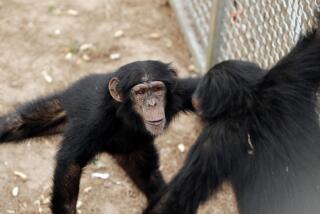Curtains for orangutans
- Share via
Is acting a good career choice for an ape? Last week, a Frazier Park animal actors ranch -- amid media coverage that highlighted the unseemliness of performance work involving nonhuman primates -- donated six of its eight orangutans to a sanctuary in Iowa. With the remaining two orangutans from Steve Martin’s Working Wildlife now in a retirement preserve, this effectively ends the local market for orangutan rentals to productions and photo shoots.
Yet the arrival at Iowa’s Great Ape Trust of 19-year-old Katy and her 3-year-old “child star” son Rocky (you loved him as the redhead in commercials for Aflac and Capital One) raises a question. Rob Shumaker, Great Ape Trust director of orangutan research, was happily surprised at Katy’s and Rocky’s success in adjusting to their new surroundings. “They’re both confident, very behaviorally skilled, very normal,” he said. “They’re very interactive and pro-social.”
And, outside a few brooding Method mopes, isn’t that pretty much what you’d expect from trained performers? Sing a little, dance a little, act a little, take direction, be able to fake an accent? Is it possible that these apes may have picked up some valuable skills while plying their unacceptable trade?
Shumaker evinces a Brechtian concern only for the agitprop aspects of ape performance. He worries that audiences become inured to seeing simians degraded but allows that acting training, like ballet for tots, may have benefits. “To my knowledge,” he says, “these are the first apes that have moved from entertainment to a situation where their behavior and intelligence can be monitored. It’s a phenomenally interesting opportunity.” And one that raises many more questions: Can an ape give informed consent before taking an acting gig? Is Stanislavsky or Meisner the way to go? And of course, AFTRA or SAG?
More to Read
The biggest entertainment stories
Get our big stories about Hollywood, film, television, music, arts, culture and more right in your inbox as soon as they publish.
You may occasionally receive promotional content from the Los Angeles Times.










